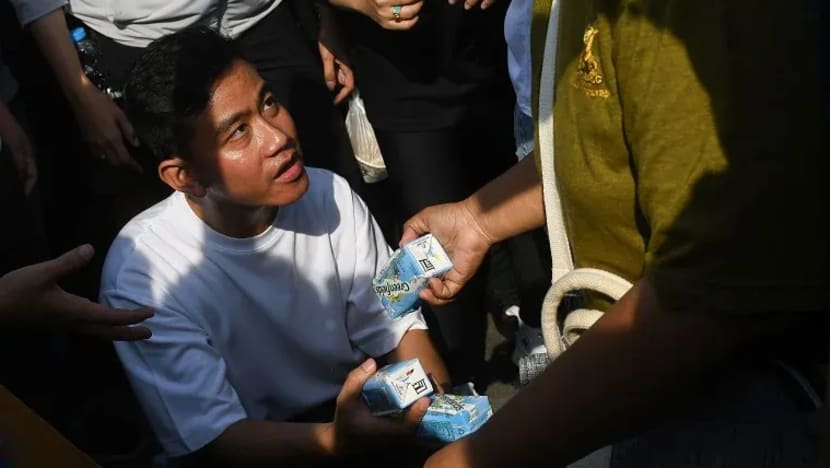Indonesia’s presidential, vice-presidential candidates under the spotlight for allegedly violating election rules
An analyst says that if the alleged violations are not taken seriously by the authorities, there could be a further erosion of trust in the electoral bodies and democratic institutions at large.

Vice-presidential candidate Gibran Rakabuming Raka distributes milk in Jakarta on Dec 3, 2023. (Photo: Antara Foto/Aditya Pradana Putra)

This audio is generated by an AI tool.
SINGAPORE: Indonesia’s presidential and vice-presidential candidates are facing a string of alleged campaign violations ranging from giving free milk to reciting poems, but analysts say that such accusations are unlikely to sway voters’ support at the country’s election on Valentine’s Day this year.
The analysts whom CNA spoke to further note that such alleged “minor” violations are likely to go unpunished and are typically seen by some voters as a “common practice” during an election cycle.
On Wednesday (Jan 3), vice-presidential candidate Gibran Rakabuming Raka was reportedly questioned by Indonesia’s Election Supervisory Board (Bawaslu) for handing out free milk to people at a public car-free day event in Jakarta last month.
Based on a 2016 Jakarta gubernatorial regulation, "events for the interests of political parties" at car-free day events in the capital city are barred.
Mr Gibran - who is the son of outgoing President Joko Widodo - is running in the election as a pair with presidential candidate Prabowo Subianto.
According to Benar News, Mr Gibran told reporters after being questioned by Bawaslu that his appearance at the Jakarta event was not a campaign promotion.
Mr Gibran had previously been reprimanded by the General Elections Commission (KPU) for gesturing to his supporters to applaud for Mr Prabowo during the first presidential debate last month, which is not allowed.
Also in December last year, campaign banners featuring Mr Prabowo and Mr Gibran at the "Welcome to Batam" monument were taken down by Bawaslu for breaching general election regulations, according to local media.
Meanwhile, the two other vice-presidential candidates - Mr Mahfud MD and Mr Muhaimin Iskandar - were also reported to Bawaslu in November last year and were accused of campaigning ahead of the official period.
Mr Mahfud is the vice-presidential candidate paired with former Central Java governor Ganjar Pranowo from the ruling Indonesian Democratic Party of Struggle (PDI-P) while Mr Muhaimin is running in the election alongside former Jakarta governor Anies Baswedan.
According to the Jakarta Post, the two candidates had on Nov 14 recited poems calling on the public to vote for their respective pairs in the election. This occurred during the KPU ballot number drawing event, which was some two weeks before the official campaigning period.
In response to the reports, Mr Mahfud’s camp and Mr Muhaimin said that their poems were read in jest and not a serious attempt to win votes. On Dec 7, Bawaslu ruled that the poems did not violate any laws or regulations.
CAMPAIGN DOS AND DON’TS ARE CLEARLY LAID OUT
Mr Beltsazar Krisetya - a researcher at the Centre for Strategic and International Studies in Indonesia - told CNA that in terms of regulations, the KPU “has clearly stated the dos and don'ts for candidates”.
In response to Mr Gibran handing out free milk at the car-free day event, Mr Afriansyah Noor - a deputy at Mr Prabowo's campaign team - claimed that his camp did not know the act was a violation, but said that it would honour Bawaslu’s ruling if the allegations are proven correct.
Mdm Khoirunnisa Nur Agustyati, executive director of the non-profit Association for Elections and Democracy (Perludem) told CNA that “what Gibran did during the car-free day is actually a campaign activity”.
She noted that Mr Gibran’s actions were a form of “self-image” in which he attempted to promote a positive view of himself and that this is seen as a form of campaigning under the election law.
His actions also had the potential to involve children which contravenes the election law, Mdm Khoirunnisa said, adding that Mr Gibran’s distribution of milk also violated a regulation in Jakarta which does not allow the car-free day to be utilised for the interests of political parties.
“It is hoped that election organisers will dare to be firm and take action against campaign violations so that there will be no more activities that are ‘essentially a campaign’ for the election but cannot be regulated and supervised as election campaign activities,” said Mdm Khoirunnisa.
Mr Wasisto Raharjo Jati - a researcher at the National Research and Innovation Agency (BRIN)’s Centre for Politics - noted that many reports regarding alleged campaign violations do not receive follow-up actions from law enforcement agencies.
This is despite a declaration by the KPU that any violation should be sentenced according to the law, he said.
“It has always been said that there was no strong evidence convicting candidates of violations since there were only minor public reports on it. Because the public seems to think that (such violations) are a common practice during the election campaign season,” said Mr Wasisto.
VIOLATIONS UNLIKELY TO CHIP AWAY SUPPORT FOR CANDIDATES
Mr Wasisto told CNA that the alleged campaign violations by candidates are unlikely to affect the election outcome as survey results show that most voters have already decided who they will be voting for on Feb 14.
Instead, such violations are likely to encourage voters to “hold on tightly to their political choices, even if the accusations are true”, amid sparring among voter groups in support of their preferred presidential candidate, noted Mr Wasisto.
Meanwhile, he said that for the small group of undecided voters, the campaign violations could be the push for them to head to the polls and vote out of concern of the violations and based on their idealism.
But he warned that they could also be swayed to abstain from voting “as they perceive that more alleged violations do not result in good leaders for Indonesia”.
Meanwhile, Mr Beltsazar noted that the alleged violations thus far are unlikely to amount to any punishment or fines as they are considered “ordinary”. Instead, he said that such violations may be used as political ammunition by the different camps.
“(This is) compared to ‘heavy’ violations such as vote-counting fraud, civil servants' questioned neutrality or fraud committed during voting day.
“The ‘heavy’ violations would sway election results, while the alleged, rather ordinary violation would be an attacking target for the opposing camps,” said Mr Beltzasar.
The alleged violations are also likely to go unpunished as it is “too risky” for Bawaslu to sanction or disqualify a candidate based on ordinary violations, he said, adding that the rules have limited enforceability and that the agency has constrained resources for thorough monitoring.
“Bawaslu's hands (are tied) to merely reprimanding or issuing a warning for the candidate,” Mr Beltsazar told CNA.
He added, however, that if the Election Management Bodies are perceived as not taking the alleged violations measurably, there could be a further erosion of trust in the electoral bodies and democratic institutions at large.
“In the long run, the public's perception of election integrity may be compromised and, at worst, affect voter turnout and, therefore, delegitimise electoral processes,” said Mr Beltsazar.


















